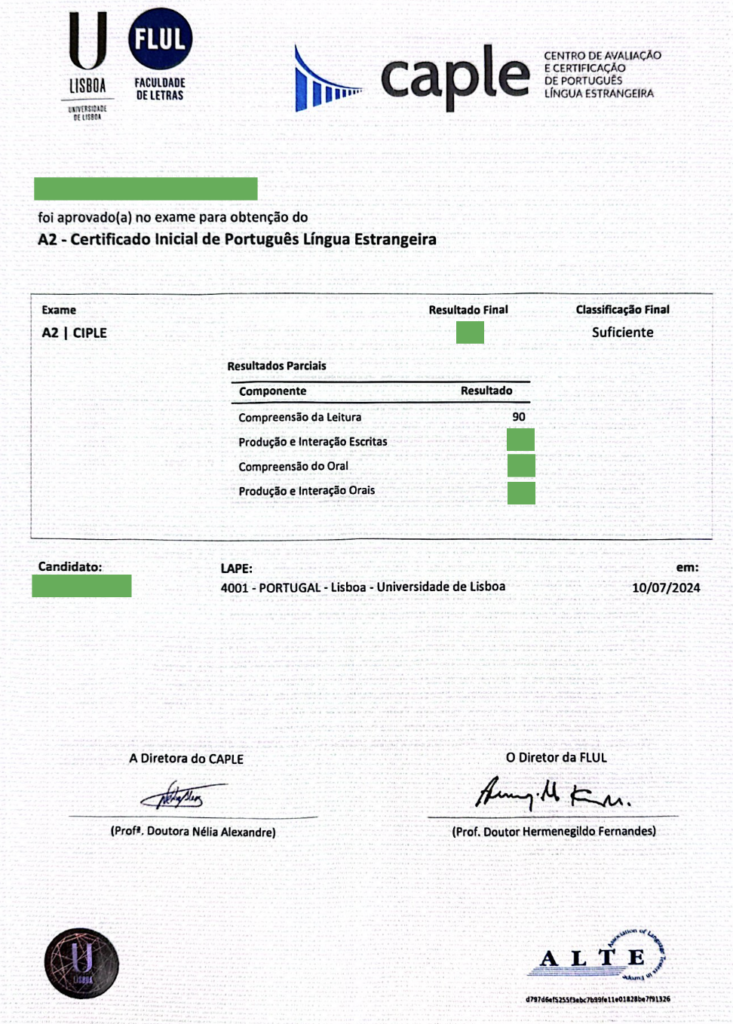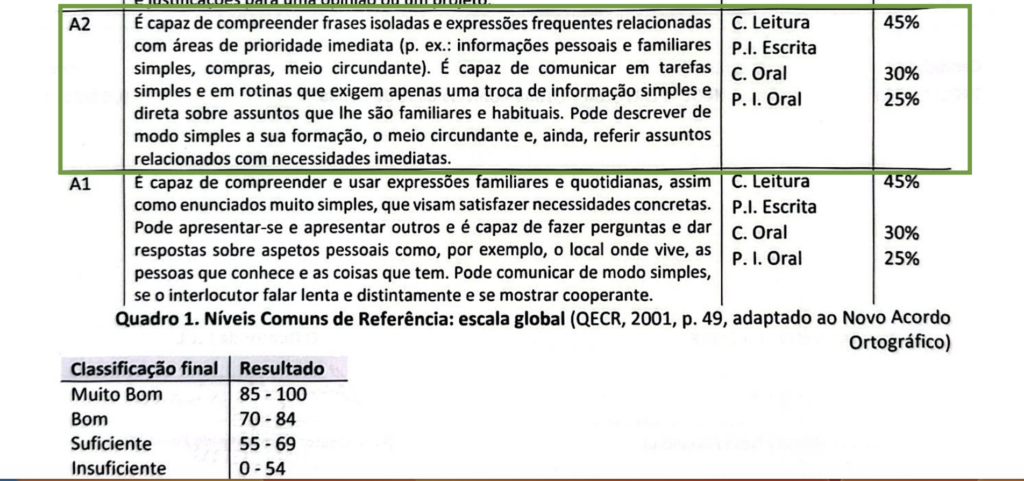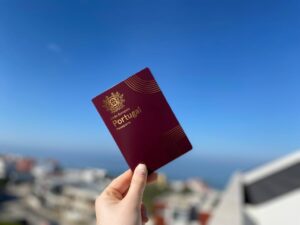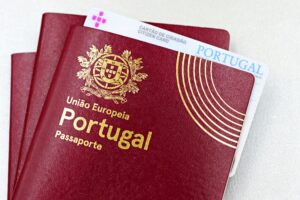
Embarking on the journey to Portuguese citizenship involves understanding and meeting the language requirements set by the Portuguese authorities. Here, I’m excited to share my experience of navigating through the Portuguese language test for citizenship and securing my status as a Portuguese citizen. This post delves into the language requirements for Portuguese citizenship, detailing my preparation for and success in the A2 exam, and answering common questions like “What level of Portuguese is required for citizenship?” and “How difficult is the Portuguese language test for citizenship?” I hope my sharing will assist those on their path to securing the Portuguese Golden Visa and citizenship!
Understanding the Portuguese Citizenship Language Exam
The Portuguese citizenship language exam, officially known as the CIPLE A2, is tailored for non-Portuguese speakers seeking to become naturalized citizens. What level of Portuguese is required for citizenship? This assessment evaluates your proficiency in Portuguese necessary for daily interactions, encompassing listening, speaking, reading, and writing. Here’s what you need to know:
- Purpose: The exam tests your ability to engage in basic conversations, understand simple texts, and express yourself in everyday situations.
- Content: It covers fundamental language structures and common vocabulary, ensuring you can comprehend and communicate effectively at a basic level.
- Significance: Passing this exam is a pivotal requirement for obtaining Portuguese nationality.
For a deeper dive into the exam structure, registration process, and preparation tips, explore our comprehensive guide on mastering the A2 Portuguese Exam .
My Journey Through the Portuguese A2 Exam
Preparing for the Portuguese A2 exam can be daunting, particularly for those of us who began with limited proficiency in the language. I’ve encountered numerous challenges and had my share of doubts about succeeding in this endeavor. Here, I share my journey through the exam, not as a showcase of personal achievement, but as a source of inspiration and practical advice for fellow Portuguese language learners or soon-to-be examinees on a similar path. This post aims to provide insights into the preparation process, offering tips and sharing experiences that might help others feel more prepared and confident. Below, you can see my CIPLE A2 certificate, which marks the end of one chapter and the beginning of another in my language-learning journey.

Is the Portuguese A2 Exam Popular?
I took the Portuguese citizenship language exam in May at the University of Lisbon, and there were several hundred of us taking the test together. The staff organized us into different small classrooms, with each room accommodating about 20 to 30 people. Although the atmosphere was tense, the entire process was very organized, giving me a sense of the exam’s professionalism.
What is the Process for the Portuguese A2 Exam?
The exam consists of several parts, and here’s how the process unfolds:
- Reading Comprehension and Writing (75 minutes)
- 30-minute break
- Listening Test (30 minutes)
- Lunch Break
- Oral Examination (approximately 15 minutes)
There were breaks and a lunch period in between, which allowed us time to hydrate or take a brief moment to relax. It was a long day, but it went by quickly since we were busy the entire time.
Exploring the Portuguese A2 Exam: Content and Tips
When preparing for the Portuguese A2 exam, it’s crucial to understand what to expect and how to prepare effectively. The exam breaks down into four key areas: reading comprehension, writing, listening, and speaking. Here’s a breakdown of each part, along with some insights I’ve gathered from my own experience.
Part One : Reading Comprehension
The reading comprehension segment involves reading short texts and responding to multiple-choice questions. The structure of these questions closely mirrors those found in mock exams, making it advantageous to practice similar formats beforehand. This not only familiarizes you with the exam style but also hones your ability to tackle the questions efficiently. Sometimes, the answers can be tricky, making thorough reading essential.
Tips for Preparation:
- Take Your Time: Instead of rushing through, take the time to thoroughly read each passage. Understanding the main points and details will aid in making informed choices when answering questions.
Highlight Important Points: While reading, I found it helpful to mark keywords or phrases. This practice allowed me to quickly refer back to key information when needed, enhancing my response accuracy.
Part Two: Writing
The writing section requires us to complete two essays with the following topics:
- Instructions for a friend on how to cook your favorite recipe
- This involves using imperative verbs to give instructions.
- A letter to a friend about your experience at a hotel, advising them whether they should stay there
- This required using two types of past tense: the imperfect and the past participle.
Preparation Tips:
- Get Familiar with Imperative Sentences: When writing a recipe, the use of imperative sentences is key, like “chop onions” or “add salt.” Make sure you can correctly use these sentence structures.
- Review Your Tenses: Especially the imperative, imperfect, and past participle. These are crucial for the writing section. You can strengthen your understanding by practicing exercises or writing short essays.
- Time Management: The writing time for the first and second section is 75 minutes. It’s advisable not to spend too much time on a single question. You might want to quickly complete the entire test and then go back to review and revise.
Mistake Alert:
In the writing section, I made a mistake by signing my name at the end of the letter (which is common in personal correspondence), but on the exam, we shouldn’t do that! The examiner pointed this out, which made me feel quite embarrassed. Although I’m not sure if this affected my score, my writing grade wasn’t great, only achieving 59 out of 100. This experience served as a reminder to pay special attention to simple format requirements during exams to avoid letting minor errors impact overall performance. I hope my experience can help other candidates avoid similar mistakes in their exams!
Part Three: Listening Test
The listening section of the A2 exam presented a real challenge for me. We had the opportunity to listen to the recordings twice before answering the questions, but the dialogues were rapid, and there was considerable background noise, making the 3-minute audio quite demanding. Picking up only fragments of words made it tough to accurately guess the answers.
Preparation Tips:
- Get Plenty of Listening Practice: Before the exam, immerse yourself in Portuguese audio, such as podcasts, music, or films. This will help you become accustomed to the pace and various accents.
- Concentrate on Comprehension: When listening, try to focus on understanding the key points and details, rather than just catching individual words. Grasping the overall context will make answering questions easier.
- Take Notes: If possible, jot down key phrases or words as you listen. This can be incredibly helpful when answering questions later.
Part Four: Oral Examination
The oral exam provided an opportunity to engage with fellow candidates. During the exam, we were grouped with another examinee, and the examiner posed questions while showing us images to describe. The focus was on describing what people in the pictures were doing, emphasizing actions or appearances. Since most of the conversation was in the present tense, it gave me a sense of ease.
Preparation Tips:
- Image Description Practice: The topics includes scenes and vocabularies on the A1 and A2 level textbooks such as describing how a person’s look, the activities (preparing meals, ironing, cleaning) they are doing. Review the lessons of A1 and A2 on verbs and vocabularies.
How difficult is the Portuguese language test for citizenship?
As I’ve shared before, my Portuguese language skills were not very strong. To be frank, the exam turned out to be more challenging than I had anticipated. The listening section was particularly tough for me; I could hardly make sense of the first part of the test, making it difficult to pick up the key points. My performance in the writing and oral sections was also impacted by my lack of thorough preparation. However, with the right preparation, following the tips I’ve outlined, the exam shouldn’t be too daunting. Reading comprehension was the one area where I felt more at ease, and it’s where I achieved my highest score (90 out of 100). Reflecting on the experience, the exam was a real test. It not only revealed areas where I need improvement but also spurred me on to put more effort into my studies moving forward. I share this in hopes that my experience can provide fellow test-takers with a clearer picture of what to expect and how to prepare!

Above: This is how the final result is calculated. 55 is the passing mark.
Post-Exam Thoughts and Key Takeaways
I managed to pass the exam with a “Pass” grade (55% – 69%). While it was a close call, this achievement allows me to confidently say I’m proficient in Portuguese, which is a step closer to obtaining Portuguese citizenship.
Key Takeaways:
- Stay Confident: Many candidates are fluent in Portuguese, but if you’re still working on your fluency, don’t lose heart! Remember that everyone’s learning journey is different, and persistence will pay off.
- Plan Ahead: Right after the exam, I was unsure if I would pass, so I checked online for other exam dates. Unfortunately, all slots were full. If you don’t pass the first time, keep an eye on several exam dates and register early.
- Time Management: Exam results take about 1.5 months to be released, and collecting the certificate (CIPLE certificate) takes another month. Plan your time wisely to get the certificate ahead of time…
Is a language test required for Portuguese citizenship? Any alternatives?
o apply for Portuguese citizenship, passing a language exam is usually required, with some exceptions. Here are alternative ways to achieve Portuguese proficiency:
- University Courses: A1 and A2 levels each require 200 hours, totaling 400 hours, with exams at each level where you need at least 55% to pass. Cost is about €2200 per level.
- Online Courses: These offer a flexible learning option, needing only 150 hours and no exams, just a 90% attendance rate for certification. The cost of our partnered organization is about €4800 for group class (about 6 per class), and slightly more for private classes. Our referral will get a 5% discount. Please contact us here for more information.
Choose based on your needs and time constraints to effectively gain proficiency and certification.
How can I get citizenship in Portugal?
There are several ways to gain Portuguese citizenship. Apart from scenarios where parents are Portuguese citizens, having Portuguese ancestry, or being married to a Portuguese citizen, the main route for foreigners to obtain citizenship is through Portuguese Golden Visa and D visa program. You can acquire residency through investment or other methods and apply for citizenship after 5 years. After passing the Portuguese language exam and obtaining certification, immigrants can start the process of applying for citizenship. Here are some common questions I often encounter, which I’ll address for you:
How to apply for Portuguese Citizenship?
The requirements are really simple.
- Passport
- Apostilled birth certificate
- Apostilled no criminal record
- CIPLE exam certification or course certification
- Your residence cards for the past 5 years
- A residence address
After preparing all the necessary documents for Portuguese citizenship, you will be able to apply for your citizenship. For detailed application procedures contact The Golden Portugal.
Do I need to apply for permanent residency before applying for citizenship?
The answer is no. You can apply directly for citizenship without first obtaining permanent residency. This is also the approach I chose for myself, as my residence card only expired in 2026. But remember you can’t let your residence card expire. If during your wait for your citizenship, your card expires, you should renew your temporary residency or apply for permanent residency.
How long does it take to apply for citizenship?
The current application process takes approximately 1 to 1.5 years.
Do I need to reside in Portugal during the citizenship application process?
You don’t need to live in Portugal during the process. Even for D7 or Digital Nomad Visa, there is no requirement of stay around for the citizenship application. But note that during the whole application process, your resident card must remain valid, meaning, you will have to renew your temporary resident card (or apply for permanent residency) if it expires before you get your citizenship.
Is an interview required during the citizenship application process?
As of October 2024, there is no interview needed for the citizenship application.
Does Portugal allow dual citizenship? What if I already have a few passports?
Yes, Portugal accepts dual citizenship, so there is no issue with how many passports you hold. Some members of our team, including myself, would have a third passport if successfully obtaining a Portuguese one.
The A2 exam for Portuguese naturalization represents a pivotal milestone in your journey towards becoming a Portuguese citizen. By thoroughly understanding each aspect of this process, you can navigate the application with confidence. Should you require any assistance or personalized advice, our team is here to help. Feel free to reach out to us at any time for support and guidance .






















